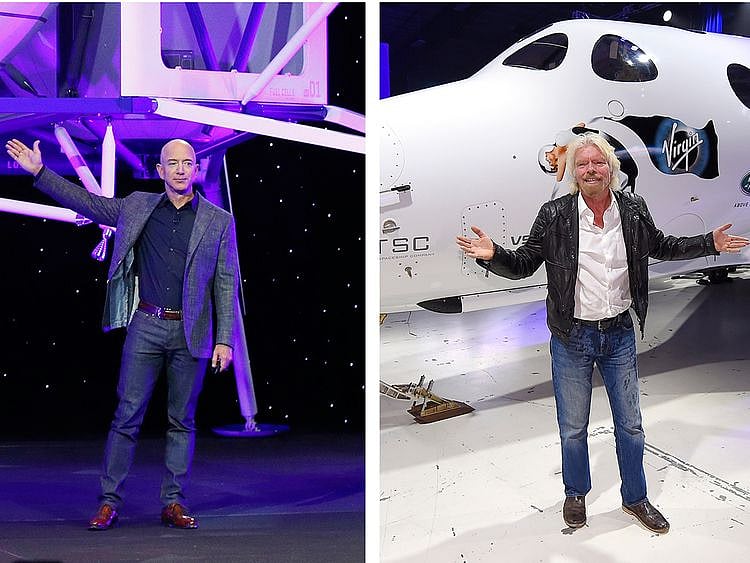Virgin Galactic, Blue Origin face off in space tourism market
Virgin Galactic plans to start regular commercial operations in early 2022

Also In This Package
Virgin Galactic launches latest generation of spaceship
Photos: Jeff Bezos takes his girlfriend to Taj Mahal
Virgin Galactic unveils commercial space suits
47,000 satellites: Battle of billionaires heats up
Branson unveils his luxury, adults-only cruise ship
In Pictures: Who is Amazon’s new CEO Andy Jassy?
Washington: The era of space tourism is set to soar, with highly symbolic flights by rivals Virgin Galactic and Blue Origin scheduled just days apart.
Virgin Galactic - founded by flamboyant British billionaire Richard Branson - is planning for a July 11 space flight. Blue Origin - started by Jeff Bezos of Amazon fame - is set to blast off on July 20.
The two companies will serve the nascent market for suborbital flights lasting just a few minutes, long enough for passengers to experience weightlessness and view the contour of the planet.
But that's where their similarity ends.
Branson, who heads the Virgin Group conglomerate that includes everything from entertainment to financial services to telecoms, founded Virgin Galactic in 2004. The 70-year-old's previous daredevil exploits include crossing the Pacific in a hot-air balloon and navigating the English Channel in an amphibious vehicle.
Also Read
Space, the final frontier for billionaire Richard BransonJeff Bezos says Blue Origin will take the first woman to moon's surfaceNASA selects SpaceX, Blue Origin to land humans on Moon in 2024Amazon's Bezos unveils Blue Moon lunar landerJeff Bezos says he'll travel to space on Blue Origin flightFamily of Indian-American astronaut on Virgin Galactic crew ‘happy and overwhelmed’Billionaire blast off: Virgin's Richard Branson announces plan to beat Jeff Bezos to spaceVirgin Galactic test flight reaches space from New MexicoBezos is 57 years old and the world's richest man. A science fiction fan, he founded Blue Origin in 2000 and recently stepped down as Amazon CEO to focus on space projects and other endeavors.
Different spacecraft
The spacecraft developed by the two companies could not be more different.
Virgin Galactic's spacecraft is not a classic rocket. It's attached to the belly of a large carrier airplane that takes off from a runway.
After an hour it reaches an altitude high enough to release the smaller spacecraft, the VSS Unity, that in turn fires its engines and reaches suborbital space - where passengers float weightlessly for a few minutes - then glides back to earth.
The spacecraft can accommodate two pilots and up to six passengers. The cabin has 12 large windows and 16 cameras.
Blue Origin in contrast is more of a classic rocket experience, with a vertical blast-off that accelerates to more than Mach 3, or three times the force of Earth's gravity.
Once it reaches the proper altitude, a capsule separates from the booster and then spends four minutes at an altitude exceeding 60 miles (100 kilometers), during which time those on board experience weightlessness and can observe the curvature of Earth.
The booster lands autonomously on a pad two miles from the launch site, and the capsule floats back to the surface with three large parachutes that slow it down to about a mile per hour when it lands.
The capsule has six seats and six large windows.
Commercial ambitions
Virgin Galactic plans to start regular commercial operations in early 2022, and is aiming to carry out 400 flights per year from Spaceport America, its base in New Mexico.
Some 600 tickets have already been sold, including to Hollywood celebrities, for prices ranging between $200,000 and $250,000. Tickets are expected to be even more expensive when they go on sale to the public.
Blue Origin has yet to announce ticket prices or a date for the start of commercial operations. But a seat for the July 20 flight was sold an auction - and the mysterious winner paid $28 million.
Sign up for the Daily Briefing
Get the latest news and updates straight to your inbox
Network Links
GN StoreDownload our app
© Al Nisr Publishing LLC 2025. All rights reserved.